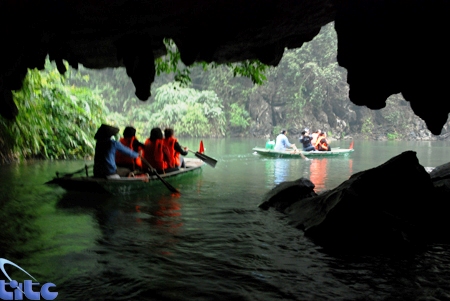Vietnam has applied to the United Nations Educational, Scientific and Cultural Organization (UNESCO) for recognition of the Trang An ecological complex in Ninh Binh Province as a world heritage site, Ninh Binh Province Department of Planning and Investment Director Nguyen Chi Tinh told the Vietnam Economic News on January 20.

The 10,000-plus hectare Trang An complex consists of the former capital at Hoa Lu, Tam Coc and Bich Dong natural beauty site and Trang An ecological tourist attraction. The 4,000ha Trang An ecological tourist attraction is the entire Trang An limestone area that is surrounded by 8,000ha, mostly consisting of rice fields. The site dates back some 250 million years and has hundreds of valleys and caves.
Trang An has great aesthetic and geological values, so on September 27, 2011, the Government agreed for application to be made to UNESCO to recognize Trang An as a world heritage site. On July 24-25, 2012, Ninh Binh Province, in coordination with the Ministry of Culture, Sports and Tourism, the Vietnam National Commission for UNESCO and the National Cultural Heritage Council, sponsored a seminar on defining the globally significant values of the Trang An complex for the submission dossier.
After two days of discussion, domestic and foreign seminar participants agreed that the application should feature the site's archaeological, aesthetic and geological values. Professor Paul Dingwall from UNESCO's World Conservation Society said that successful human evolution depends on human adaptability to changes in the environment, and that Trang An provided strong evidence of this adaptability. The Trang An profile has a high possibility of success if it is systematically prepared.
Vietnam Institute of Geosciences and Mineral Resources Director Tran Tan Van said that the Trang An site had been largely untouched, especially since Ninh Binh selected areas for conservation and development, including strictly protected areas, areas of historical, architectural, artistic and archaeological merit, highly protected areas and sites designed for tourism development, and villages and communes where people are living. Van said he believed that with its great cultural, aesthetic and geological values, Trang An would become a world heritage site in the near future.
Ninh Binh Province leaders said that the Trang An application profile had been well-perceived and well-prepared.
According to the schedule, the UNESCO will return the profile to Ninh Binh in early 2013 to seek clarification on some points, and then the amended profile will be resubmitted; Trang An is expected to be considered for world heritage site recognition by UNESCO in early 2014.